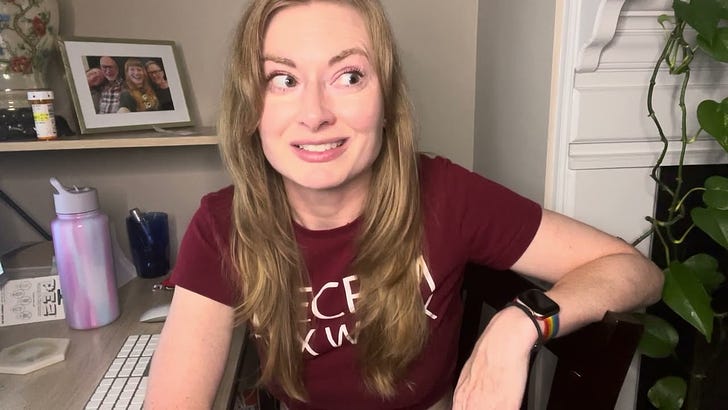Especially as an Autist, it’s extremely satisfying to classify people — healthy or BROEKN, abuser or good partner. Same for behaviors.
But the Jonah Hill situation reminds me that, like most things in life, abusive vs healthy is a spectrum, not a binary. And it’s highly contextual.
We could start by defining abuse as any behavior that hurts another person. But people hurt each other in relationships all the time and it’s not abuse. We could add the descriptor “intentionally.” But most of us have said something meant to wound the other person in the heat of an argument and don’t cop to abuse.
Besides physically injuring another person, nearly every behavior we could classify as abusive is only clearly abusive in the context of a power discrepancy. Two equally empowered people who treat each other like shit equals two volunteers and zero victims.
But how big does that discrepancy have to be to meet the criteria for abuse?
We could also define abuse as behavior that hurts another person who cannot leave the relationship. But very few abusers chain their survivors to a radiator.
Almost no one is always literally physically incapable of leaving their abusive partner. They don’t want to leave. Or, they do want to leave, but they want to avoid whatever is on the outside even more. So they remain in a relationship that’s bad for them.
At what level of disempowerment will someone remain in a relationship that’s bad for them?
For example, let’s say a man encouraged his wife to quit her job and move away from her community. He tells himself and her that their lives will be better in this new city. She even doesn’t like her job and her friends and family weren’t that good for her either.
Once she’s isolated and financially and emotionally dependent on him, he starts hitting and berating her. I genuinely hope most of us could easily identify that man as an abuser.
But not every instance of dependence and/or isolation is abusive. For example, a study followed female Harvard Business School grads and found that most of them got married and followed their husband’s careers. (There’s a reason the wage gap widens significantly when women get married and have kids.) Some of the men who married the Harvard Business grads also probably encouraged their wives to quit or work fewer hours at their jobs and move away from their friends and families so they could work longer hours at a better job.
In both cases, the women end up disempowered relative to their husbands. But almost no one would classify this behavior as abuse.
On Medium, Selena Routley commented on my Jonah Hill post arguing that I was wrong when I wrote that every man who actively seeks to disempower his female partner isn’t necessarily an abuser.
I’d argue that it really depends on why he’s disempowering her.
To me, Jonah Hill is somewhere in the middle, but closer to the abuser side. There’s no evidence he was thinking, “This is a good opportunity for me to disempower my girlfriend so it’s harder for her to leave me so I can abuse her.” Probably very few abusers consciously think that, or have the self-awareness to see it in themselves at the time.
Jonah Hill seems to have told Sarah Brady that he can’t date her unless she dresses and behaves differently because her wearing bikinis in photos and working with and being close friends with men made him feel bad. It just so happened that her changing her behavior would have disempowered her.
I think Hill’s behavior is closer to abuse than what happened to the Harvard wives for two reasons. First, the power discrepancy between the Harvard wives and their husbands seems smaller than that between Sarah Brady and Jonah Hill. Hill had both more money and fame than Brady. Second, because mate guarding is a much shittier reason to disempower a woman than to raise your household income.
The Harvard study demonstrates that a power imbalance is necessary, but insufficient, for abuse. Abuse requires one party to be at such a disadvantage that they’re afraid enough of the consequences of leaving the relationship to stay despite it being bad for them.
A woman at a small disadvantage will tolerate a small amount of discomfort. A Harvard Business grad might tolerate her breadwinner husband leaving his dirty socks around the house because she decided to leave the workforce to raise their kids and doesn’t want to deal with getting back on the corporate ladder. Or, she might tolerate him occasionally raising his voice when they argue. Or cheating on her. When, exactly, does merely unpleasant behavior tip over into abuse?
Or, perhaps on paper a woman has more power than her husband. But because of gender norms or trauma or whatever she’s unable or unwilling to leave. I’m reminded of the studies I linked from this post that showed that men who earn less than their wives cheat on them and commit domestic violence more often than breadwinner men.
In these cases, the abuser didn’t have to disempower the victim. She showed up to the negotiation with a disadvantage. And neither of them may be consciously aware of it.
I guess where this leaves me is that an abusive relationship is one in which one person has to create, or take advantage of, a situation in which their partner has too little agency to leave a relationship that harms them on-net.
While that’s a decent definition, if I do say so myself, I’ll readily admit that it leaves room for hella ambiguity.
An individual’s agency/power is extremely difficult to measure, as is whether a relationship is on-net harmful. Some people can easily tolerate being called names on a daily basis. Others will go slowly mad over the disrespect of their partner leaving dirty dishes in the sink. Some people will leave a relationship with $2 in their bank account, letting Jesus take the wheel. Others need a safety net in place first.
All this is really uncomfortable to acknowledge and grapple with. But I think it’s really important to continually ask ourselves whether our relationships are on-net good for everyone involved and how much agency we feel like everyone has to leave if that’s the right move for them.















Share this post